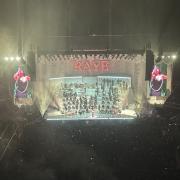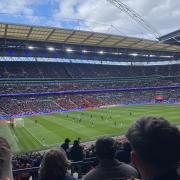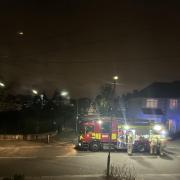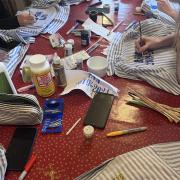
Finlay Hawker is establishing himself more and more in the world of competitive cycling.
At the age of eight, Hawker decided to join Hillingdon Slipstreamers, a cycling club based in Minet Country Park, in order to learn about and begin competitively racing. The club taught him “how to ride a bike properly” and helped him “up to a high level”. After a few sessions, he was glued to the adrenaline and rivalry of the racing scene; “The sensation it gives you, the thrill of the race. You almost get addicted to it”, he says.
After around four years of practice, Hawker represented Hillingdon Slipstreamers at the 2017 European Championships held in Assen, The Netherlands. The race consisted of two time trials and four stage races; six stages in total. The event also comprised a considerably flat course, something which didn't lend to Hawker’s strengths. However, he came home successfully with first place, a magnificent achievement demonstrating his talent.
After such success in The Netherlands, Hawker decided to move from the far west of London to the South-Eastern Herne Hill Velodrome; the home of the cycling racing club VC Londres (VCL). Hawker was now at the stage where he wanted “to go to places” with his cycling and so a “very successful” and “high level” club like VCL was perfect. “It pushes me to the limit!” Hawker remarks about the strenuous training sessions.
As with any serious sports commitment, training plays a major role in performance. For Hawker, training is consistent and intense, consisting of just one or two rest days per week. “Monday night is the only session I do in the track. On Tuesday morning, I go and do some hill reps. On Wednesday, I do a 40/20 session and on Thursday I would do another sprint session”. Friday is a necessary rest day as an endless weekend awaits; “I'll go down to Surrey, just over 100 kilometres, on Saturday”, Hawker says, “It's a steady ride but I hit it up the climbs to get some sprints in”. Surrey is a hotspot for city cyclists as it is home to numerous, fierce climbs with many hitting gradients above 10% for leg-drenching stretches. For Hawker, Crocknorth and Whitedown lane are favourites, both averaging around the 10% margin (over three times as steep as Richmond Hill). The next day, there is even more. “I will do Windsor (an 80 kilometre loop) as a steady endurance ride”. However, catching a cold due to notorious English weather is the last thing he would like. “If the weather is bad, I will do an indoor session”.
When it comes to training motivation, Hawker does not struggle. The ultimate dream “to become a professional cyclist” constantly beckons him to work as hard as possible. There are other mentally rewarding sides, with cycling proving “a good stress reliever”. Hawker speaks about Strava, a cycling and running app. Having only got the app last year, Hawker has capitalised on Strava’s popular segment feature. Here, the 49 million people, using the app, battle out on certain stretches of routes to see who can take the prized possession of a KOM (King of Mountain, the fastest time ever on the segment). Hawker greatly enjoys the “competitive element” of segments; “It's a great tool to measure your improvement”, Hawker says, “you want to get to the top of the leaderboard and get the KOM”. Hawker now unsurprisingly hold 33 KOMs.
During days prior to a race, most sportsmen will constantly have a deep feeling of nerves. It's often the opposite for Hawker; “Particularly if the race is to my strength, if it has a hill in it, it's something I really look forward to as I can potentially do really well. It is always an opportunity for me to prove something”.
Nutrition is a key subject for many cyclists. At the end of the day, if you haven't taken on board enough or the right fuel then you will really struggle at the end of the ride. For Hawker, carbohydrate is key as well as some additional fuel from an energy drink; “Before I do a big ride in the morning, I will always have a plate of beans on toast because that gives me a stack of carbohydrates and some protein. On the actual ride, I'll take a bottle of energy drink. In the evenings before training, I will have some pasta in the car, it's great carbohydrate”. Before races a similar approach is taken; “I have lots of carbs the night before, I'll have a big breakfast and before a race I'll be having my energy drink”.
A question which springs to the mind is ‘Is all of the training and dedication worth it?’ Hawkers’ results certainly say yes. He speaks about his most recent race, the National Hill Climb Championships; “I won the u15 category. I came third in the u16 category and eighth in the u18 category.” Fastest rider out of a widespread field of strong cyclists his age. Not too bad. It's amazing to see again that he even registered a top 10 in the junior (u18) category. This is the entire of the United Kingdom.
Hill climbs are evidently Hawker’s speciality. Yet his efforts on a track, an arena much more suited to the “stocky”, muscular cyclists, certainly highlight his all-round ability. In the Hern Hill Track League this summer, he “picked up quite a few second places” even though many towering adults partook in the event.
It is thought provoking to hear of a race series Hawker competed in, earlier this year, where he did not achieve the result he was aiming for. “Back in January and February, in the Icebreaker series over in Newport, admittedly I didn’t do very well”, he says, “I was going through a rough patch in my cycling. In round one, I came third overall, in round two, I crashed so I ended up seventh”. This slight setback for Hawker clearly demonstrates that every cyclist, no matter how successful they are, will always have tough events where they don't achieve what they would have hoped.
For a busy schoolboy, reasonably close to GCSEs, many would wonder whether schoolwork would get in the way of Hawker’s serious commitment to cycling. For Hawker, “it’s not a matter of prioritising one over the other”; he feels strongly that as long as he “pay[s] attention in class” so he “know[s] all the stuff”, he can then “do all the cycling [he] would want to do, if [he] had all the time in the world. While still being able to balance doing stuff like homework”. He continues, “I would never restrict my cycling to allow me to revise more, nor would I sacrifice parts of my education to get more cycling in”.
It is clear Hawker still feels he has enough time for cycling training, but what about free time and leisure away from a busy world of mental and physical exertion? Hawker admits “I have less free time in general”, yet he goes on to say, “Training is my enjoyment. When I'm training, that's not me sacrificing my free time because that's what I like doing in my free time.” It is a great sign to see that he has such a connection with cycling, something which will surely help him in future years, where there are so many ambiguous and unprecedented corners to turn.
Looking to the future, Hawker acknowledges how tough and defined the cycling world is. Yet he is determined to put the early mornings and long hours in, to give him the greatest opportunity of becoming a professional rider. He loves to race on both the road and the track, but ultimately dreams of racing in Europe up climbs in major grand tours, “fighting for the win”.
Hawker has really emphasised how sedulous and persevering you have to be to stay in the fast and dynamic peloton of competitive cycling. It is inspirational to hear how persistent and dedicated he is for someone who hasn't even taken GCSEs. It is frankly crazy. Hawker is already demonstrating not just the physical, but the mental qualities of professional cyclist.



























